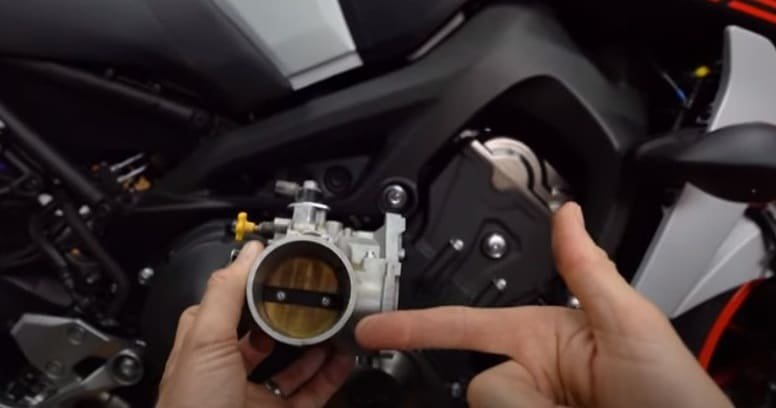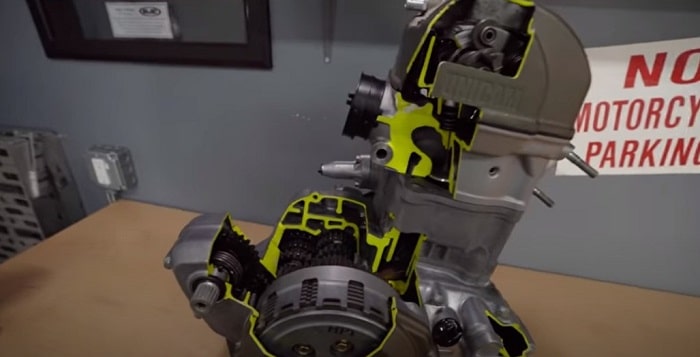At some point in your riding career you will have noticed that other riders use engine braking to slow down their bike. The engine get very noisy, but is engine braking really that bad for your motorcycle?
I can understand where the concern comes from because engine braking makes the motor sound strained, but unless you have downshifted to a gear that causes the motor to rev up into the red line, no harm is being done to your motorcycle engine.
There’s a lot of confusion and misunderstanding out there about engine braking. Today I’ll explain what engine braking is, how it works, and whether it’s a bad thing, or perhaps even a good thing.
When you close the throttle, engine braking allows drag in the engine to slow the motorcycle down.
How Engine Braking Works On Your Motorcycle
Table of Contents
When you’re rolling down the road, and the throttle is open, the throttle bodies behind the cylinder are also wide open, so fuel and air easily pass into the cylinder as the piston moves down on the intake stroke.
If you were to look into the throttle body, you would see that when the throttle is open, you’ve got a nice wide-open bore.
The fuel and air will pass through that easily, but when you close the throttle, the throttle plate snaps closed, but the piston is still trying to do its thing.

It’s still moving down in the intake stroke, still trying to pull air and fuel into the cylinder, but it can’t because it’s, doing it against a closed tube.
You get a lot of intake vacuum, and that vacuum puts a drag on the piston, which slows it down and slows down the rear wheel.
The first area of concern is the lack of lubrication. However, when you’re engine braking, it is the throttle plates that are closed, It’s not the oil pump that has been shut off.
It’s still operating. It is still pushing oil through the filter, still distributing oil to the piston, to the cam in the top end, to the clutch’s Transmission.
There is plenty of lubricating oil being distributed around an engine, so, with a four-stroke, lack of lubrication is not an issue.
Is Engine Braking Bad For a 2 Stroke Motorcycle?
There is plenty of residual oil in the engine to deal with a few moments of engine braking in a two-stroke engine, even though there is no gas getting into the engine. The piston will not suffer, and neither will the crank; everything will be fine.
The only scenario I can potentially see engine breaking with a two-stroke being a problem is when you are using it to control your speed during a long descent, like going down a mile-long mountain pass.
Other than that, it’s really not an issue, and I can tell you that the piston and crankshaft in my bike have been subjected to lots of engine braking at the racetrack, and it’s got no undue wear as a result. It just wore out from living a good life.
Will Engine Braking Cause My Engine To Overheat?
My Yamaha MT-09 has a very large radiator, and it’s there to manage and dissipate the heat that this engine creates when it’s being ridden at full throttle at high rpm.
When you get the gas open, you’re pouring a lot of fuel in the fire, lots of heat to deal with. When you’re engine braking, there is little to no fuel being put on the fire; therefore, there is less heat being created, so why wouldn’t this cooling system manage that?
Less heat to manage, even though it is designed to deal with a lot of it, and frankly, it’s the same scenario for an air-cooled bike.
You’re producing less heat from the engine while engine braking, yet the air is still flowing over the cylinder, still drawing that heat away, so clearly, an overheated engine as a result of engine braking is not an issue.
Does Engine Braking Damage The clutch Or Transmission?
And finally, there is the concern about the clutch and or transmission damage. Transmission gears are very robust, as is the clutch pack, and these components are designed to handle a lot of force.

A motorcycle engine is built to deal with all of the torque of a full-throttle start. So, if the engine can handle that, why can’t it handle a fraction of that force during engine braking?
It’s not an issue, and the clutch plates and transmission gears do not care which direction the force is coming from.
Even if engine braking isn’t bad for your engine, there is one drawback, and that is that if you’re using it exclusively to slow it down, it doesn’t illuminate your brake light.
Drivers behind you might not be aware that you’re scrubbing speed, and as a rider that has been rear-ended on the freeway, I can tell you that it sucks
So I trigger the brakes and check my mirrors anytime I’m slowing down, even if I’m using engine braking. So normal engine braking does not impart any undue harm or damage to the engine in any way.
Benefits Of Using Engine Braking For Your Motorcycle
In some instances, engine braking can be good for your motorcycle engine. For starters, using engine vacuum to slow down instead of your brakes means your brake discs and pads get a break.
It is a small benefit, but it is a benefit nonetheless, and perhaps the most practical use of engine braking is during long descents when it can prevent your brakes from overheating.
If you open up your owner’s manual, it probably even suggests using engine braking for that exact purpose.
Then you’ve got track day, riders and racers, and sport riders who rely on engine braking to scrub speed as they go into a corner.
It also ensures that the engine is revved up and in the meat of the power when you roll on the gas leaving the turn.
So whether you’ve been wondering if engine braking is bad for your bike, or perhaps you weren’t even aware of what engine braking is, now you know that it is safe and is a useful way to slow down your motorcycle.


